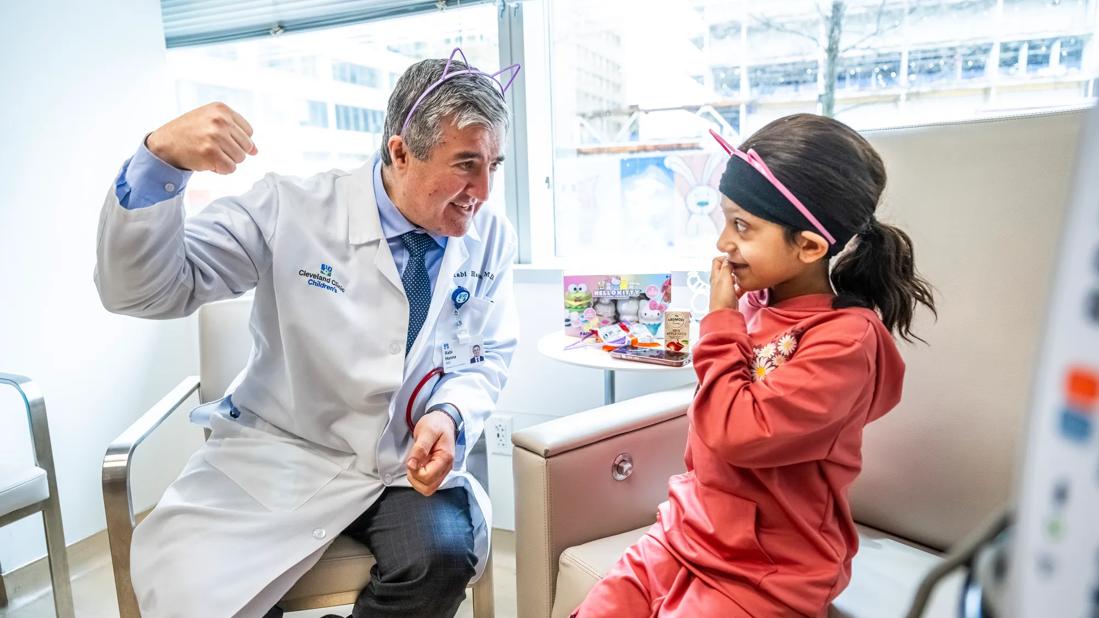Meet Rabi Hanna, MD

Cleveland Clinic Children’s is pleased to name Rabi Hanna, MD, as its new chair of the Department of Hematology-Oncology and Bone Marrow Transplant.
Advertisement
Cleveland Clinic is a non-profit academic medical center. Advertising on our site helps support our mission. We do not endorse non-Cleveland Clinic products or services. Policy
Dr. Hanna, who is board-certified pediatrics and pediatric hematology-oncology, joined our team seven years ago when he first established our pediatric BMT program. His specialty interests include acute myeloid leukemia, as it lags behind other pediatric cancers in survival improvements, as well as expanding access to BMT for patients with thalassemia, sickle cell disease and other hematological disorders.
Consult QD recently sat down with him to learn what drives his passion for helping patients and his plans for the program moving forward.
A: When I was 6 years old, I started limping and was unable to bear weight. My parents took me to an orthopaedist who diagnosed me with Legg-Calve-Perthes disease. The doctor told me I could not play soccer because it would be detrimental to the recovery of my hip bone. That made me sad, but then the doctor taught me how to play chess. He inspired me to become a “healer” similar to him, a doctor, but also someone who could take a sad situation and make the best of it.
I did my medical training at the University of Aleppo. During my fifth year, my aunt was diagnosed with acute myeloid leukemia and needed a BMT — my mom was the donor; they travelled to Belgium for the procedure — so I wanted to learn more about this life-saving therapy. In 2004, I went to Duke University, which has a strong BMT program, to do a pediatric residency. After that, I went to the Fred Hutchinson Cancer Research Center in Seattle where Dr. Donnall “Don” Thomas and his wife, Dottie, pioneered BMT. Finally in 2010, I came to Cleveland Clinic to start a pediatric BMT program.
Advertisement
A: I was attracted to the challenge of starting a new program and the relationship here with the adult cancer program. Because of that relationship, we are able to provide therapies such as a new cellular and immunotherapy treatment, advanced interventional radiology and radiation-oncology. We also provide more access to clinical trials because we can combine pediatric patients — which might not be a large enough group on their own — with young adult and adult patients.
A: I want to develop alternative-donor BMT procedures such as Human Leukocyte Antigen (HLA). It allows us to use donors who are a 50 percent match to the patient such as a parent or a sibling thereby expanding access to BMT for disorders such as sickle cell disease where finding HLA-matched family or unrelated donors could be difficult. I am also interested in using BMT to restore immune systems in patients with immune deficiency or immune dysregulation and to reset the immune system for people with disorders such as multiple sclerosis and Crohn’s disease.
A: I strongly believe in Cleveland Clinic’s mission: “To provide better care of the sick, investigation into their problem and further education of those who serve.”
Our department will focus on two major program developments: an advanced therapeutic program where we offer therapies for patients with relapsed cancer and an adolescents and young adults (AYA) program. The latter was identified by the NIH for having a care gap because of lower survival rates than pediatric and adult patients.
Advertisement
We also plan to have more integrated clinics with Cleveland Clinic-provider expertise for rare disorders such as a bone marrow failure (BMF) clinic, a cancer predisposition clinic and a thyroid cancer clinic.
A: Our survivors may have long-term complications. It’s important to have a partnership between the primary care physician and the hematology-oncology survivorship clinic so the two can diagnose any possible long-term problems that a patient may have.
Advertisement
Advertisement

Findings hold lessons for future pandemics

One pediatric urologist’s quest to improve the status quo

Overcoming barriers to implementing clinical trials

Interim results of RUBY study also indicate improved physical function and quality of life

Innovative hardware and AI algorithms aim to detect cardiovascular decline sooner

The benefits of this emerging surgical technology

Integrated care model reduces length of stay, improves outpatient pain management

A closer look at the impact on procedures and patient outcomes